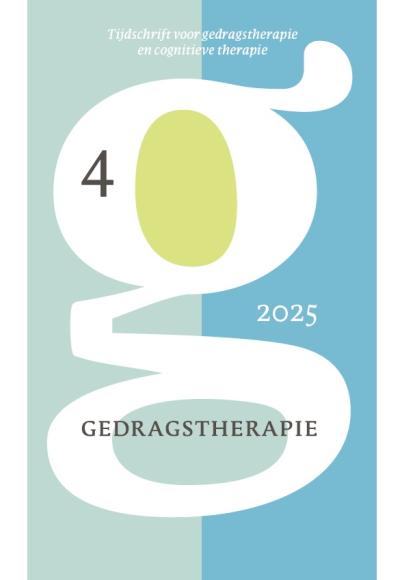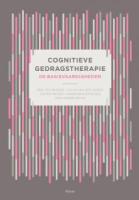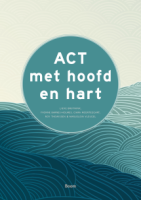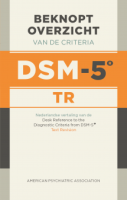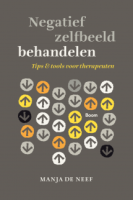Inhoud
Effectiviteit van online cognitieve gedragstherapie voor depressie in de eerste lijn
Samenvatting
Gecomputeriseerde cognitieve gedragstherapie (CCGT) kan mogelijk een oplossing bieden voor de huidige onderbehandeling van depressie. Het doel van dit onderzoek is het vaststellen van de klinische effectiviteit van online, onbegeleide CCGT voor eerstelijnsbehandeling van depressie. Daartoe werden 303 depressieve patiënten willekeurig verdeeld over (a) Kleur Je Leven (KJL), (b) de gebruikelijke zorg door de huisarts (‘Treatment as Usual' = TAU) of (c) een combinatie van KJL en TAU. KJL is een online, interactief, multimedia CCGT programma. Er werd geen begeleiding geboden. Er was een follow-up periode van 6 maanden. Er werden bij de intention-to-treat-analyses en de per-protocol analyses geen significante verschillen vastgesteld tussen de drie interventies. De online, onbegeleide CCGT liet geen betere resultaten zien dan de gebruikelijke zorg door de huisarts, en de combinatie van beide liet geen aanvullende effecten zien. De afname van depressieve symptomen bij matig tot ernstig depressieve patiënten was in alle drie de interventies matig. Online CCGT zonder begeleiding is niet geschikt voor alle depressieve patiënten.
Literatuur
- Aaronson, N.K., Muller, M., Cohen, P.D., Essink-Bot, M.L., Fekkes, M., Sanderman, R., et al. (1998). Translation, validation, and norming of the Dutch language version of the SF-36 Health Survey in community and chronic disease populations. Journal of Clinical Epidemiology, 51, 1055-1068.
- Andersson, G., Bergström, J., Holländare, F., Carlbring, P., Kaldo, V., & Ekselius, L. (2005). Internet-based self-help for depression: randomised controlled trial. British Journal of Psychiatry, 187, 456-461.
- Andersson, G., & Cuijpers, P. (2008). Pros and cons of online cognitive-behavioural therapy. British Journal of Psychiatry, 193, 270-271.
- Arnau, R.C., Meagher, M.W., Norris, M.P., & Bramson, R. (2001). Psychometric evaluation of the Beck Depression Inventory-II with primary care medical patients. Health Psychology, 20, 112-119.
- Arrindell, W.A., & Ettema, H. (1981). Dimensionele sctructuur, betrouwbaarheid en validiteit van de Nederlandse bewerking van de Symptom Checklist (SCL-90); gegevens gebaseerd op een fobische en een 'normale' populatie. Nederlands Tijdschrift voor de Psychologie, 36, 77-108.
- Beck, A.T., Steer, R.A., Ball, R., & Ranieri, W.F. (1996). Comparison of Beck Depression Inventories-IA and -II in psychiatric outpatients. Journal of Personality Assessment, 67, 588-597.
- Bialik, R.J., Ravindran, A.V., Bakish, D., & Lapierre, Y.D. (1995). A comparison of placebo responders and nonresponders in subgroups of depressive disorder. Journal of Psychiatry and Neuroscience, 20, 265-270.
- Bijl, R.V., Ravelli, A., & Zessen, G. van (1998). Prevalence of psychiatric disorder in the general population: results of the Netherlands Mental Health Survey and Incidence Study (NEMESIS). Social Psychiatry and Psychiatric Epidemiology, 33, 587-595.
- Butcher, J.N., Perry, J., & Hahn, J. (2004). Computers in clinical assessment: historical developments, present status, and future challenges. Journal of Clinical Psychology, 60, 331-345.
- Butcher, J.N., Perry, J.N., & Atlis, M.M. (2000). Validity and utility of computer-based test interpretation. Psychological Assessment, 12, 6-18.
- Butler, A.C., Chapman, J.E., Forman, E.M., & Beck, A.T. (2006). The empirical status of cognitive-behavioral therapy: a review of meta-analyses. Clinical Psychology Review, 26, 17-31.
- Carlbring, P., Gunnarsdóttir, M., Hedensjö, L., Andersson, G., Ekselius, L., & Furmark, T. (2007). Treatment of social phobia: randomised trial of Internet-delivered cognitivebehavioural therapy with telephone support. British Journal of Psychiatry, 190, 123128.
- Cavanagh, K., & Shapiro, D.A. (2004). Computer treatment for common mental health problems. Journal of Clinical Psychology, 60, 239-251.
- Christensen, H., Griffiths, K.M., & Jorm, A.F. (2004). Delivering interventions for depression by using the Internet: randomised controlled trial. British Medical Journal, 328, 7434.
- Clarke, G., Eubanks, D., O'Connor, E., DeBar, L.L., Kelleher, C., Lynch, F., et al. (2002). Over coming depression on the Internet (ODIN): a randomised controlled trial of an Internet depression skills intervention program. Journal of Medical Internet Research, 4, e14.
- Clarke, G., Eubanks, D., Reid, E., Kelleher, C., O'Connor, E., DeBar, L.L., et al. (2005). Overcoming depression on the Internet (ODIN) (2): a randomized trial of a self-help depression skills program with reminders. Journal of Medical Internet Research, 7, e16.
- Cohen, J. (1988). Statistical power analysis for the behavioral sciences. Hillsdale, NJ: Erlbaum.
- Cook, R.J., & Sackett, D.L. (1995). The number needed to treat: a clinically useful measure of treatment effect. British Medical Journal, 310, 452-454.
- Cuijpers, P., Bonarius, M., & Heuvel, A. van den (1995). De omgaan met depressie cursus: een handreiking voor begeleiders en organisatoren [The coping with depression course: a manual]. Utrecht: NcGv.
- Graaf, L.E. de, Gerhards, S.A.H., Evers, S.M.A.A., Arntz, A., Riper, H., Severens, J.L., et al. (2008). Clinical and cost-effectiveness of computerised cognitive behavioural therapy for depression in primary care: design of a randomised trial. BMC Public Health, 8, 224.
- Graaf, L.E. de, Roelofs, J., & Huibers, M.J.H. (2009). Measuring dysfunctional attitudes in the general population: the Dysfunctional Attitude Scale (form A) revised. Cognitive Therapy and Research, 33, 345-355.
- Derogatis, L.R., Rickels, K., & Rock, A.F. (1976). The SCL-90 and the MMPI: A step in the validation of a new self-report scale. British Journal of Psychiatry, 128, 280-289.
- DeRubeis, R.J., Hollon, S.D., Amsterdam, J.D., Shelton, R.C., Young, P.R., Salomon, R.M., et al. (2005). Cognitive therapy vs medications in the treatment of moderate to severe depression. Archives of General Psychiatry, 62, 409-416.
- Dimidjian, S., Hollon, S.D., Dobson, K.S., Schmaling, K.B., Kohlenberg, R.J., Addis, M.E., et al. (2006). Randomized trial of behavioral activation, cognitive therapy, and antidepressant medication in the acute treatment of adults with major depression. Journal of Consulting and Clinical Psychology, 74, 657-670.
- Hamilton, K.E., & Dobson, K.S. (2002). Cognitive therapy of depression: pretreatment patient predictors of outcome. Clinical Psychology Review, 22, 875-893.
- Hirschfeld, R.M., Keller, M.B., Panico, S., Arons, B.S., Barlow, D., Davidoff, F., et al. (1997). The National Depressive and Manic-Depressive Association consensus statement on the undertreatment of depression. JAMA, 277, 333-340.
- Hollon, S.D., Stewart, M.O., & Strunk, D. (2006). Enduring effects for cognitive behavior therapy in the treatment of depression and anxiety. Annual Review of Psychology, 57, 285-315.
- Jacobson, N.S., & Truax, P. (1991). Clinical significance: a statistical approach to defining meaningful change in psychotherapy research. Journal of Consulting and Clinical Psychology, 59, 12-19.
- Kaltenthaler, E., Brazier, J., De Nigris, E., Tumur, I., Ferriter, M., Beverly, C., et al. (2006). Computerised cognitive behaviour therapy for depression and anxiety update: a systematic review and economic evaluation. Health Technology Assessment, 10, 1-186.
- Kaltenthaler, E., Sutcliffe, P., Parry, G., Beverly, C., Rees, A., & Ferriter, M. (2008). The acceptability to patients of computerized cognitive behaviour therapy for depression: a systematic review. Psychological Medicine, 38, 1521-1530.
- Katon, W., Von Korff, M., Lin, E., Walker, E., Simon, G.E., Bush, T., et al. (1995). Collaborative management to achieve treatment guidelines. Impact on depression in primary care. JAMA, 273, 1026-1031.
- Kenwright, M., Marks, I., Graham, C., Franses, A., & Mataix-Cols, D. (2005). Brief scheduled phone support from a clinician to enhance computer-aided self-help for obsessivecompulsive disorder: randomized controlled trial. Journal of Clinical Psychology, 61, 1499-1508.
- Kessler, R.C., Berglund, P., Demler, O., Jin, R., Koretz, D., Merikangas, K.R., et al. (2003). The epidemiology of major depressive disorder. Results from the National Comorbidity Survey Replication (NCS-R). JAMA, 289, 3095-3105.
- Lewinsohn, P.M., Antonuccio, D.O., Steinmetz, J.L., & Teri, L. (1984). The coping with depression course: a psychoeducational intervention for unipolar depression. Eugene: Castalia Publishing.
- McCrone, P., Knapp, M., Proudfoot, J., Ryden, C., Cavanagh, K., Shapiro, D.A., et al. (2004). Cost-effectiveness of computerised cognitive-behavioural therapy for anxiety and depression in primary care: randomised controlled trial. British Journal of Psychiatry, 185, 55-62.
- McHorney, C.A., Ware, J.E., & Raczek, A.E. (1993). The MOS 36-item short form health survey (SF-36): II. Psychometric and clinical tests of validity in measuring physical and mental health constructs. Medical Care, 31, 247-263.
- Mundt, J.C., Marks, I.M., Shear, M.K., & Greist, J.H. (2002). The Work and Social Adjustment Scale: a simple measure of impairment in functioning. British Journal of Psychiatry, 180, 461-464.
- Newman, M.G., Consoli, A.J., & Barr Taylor, C. (1999). A palmtop computer program for the treatment of generalized anxiety disorders. Behavior Modification, 23, 597-619.
- Osgood-Hynes, D.J., Greist, J.H., Marks, I.M., Baer, L., Heneman, S.W., Wenzel, K.W., et al. (1998). Self-administered psychotherapy for depression using a telephone-accessed computer system plus booklets: an open U.S.-U.K. study. Journal of Clinical Psychiatry, 59, 358-365.
- Patten, S.B. (2003). Prevention of depressive symptoms through the use of distance technologies. Psychiatric Services, 54, 396-398.
- Paykel, E.S., Tylee, A., Wright, A., & Priest, R.G. (1997). The Defeat Depression Campaign: psychiatry in the public arena. American Journal of Psychiatry, 154(6, suppl), 59-65.
- Posternak, M.A., & Miller, I. (2001). Untreated short-term course of major depression: a meta-analysis of outcomes from studies using wait-list control groups. Journal of Affective Disorders, 66, 139-146.
- Proudfoot, J., Goldberg, A., Mann, A., Everitt, B., Marks, I., & Gray, J.A. (2003). Computerized, interactive, multimedia cognitive behavioral program for anxiety and depression in general practice. Psychological Medicine, 33, 217-227.
- Proudfoot, J., Ryden, C., Everitt, B., Shapiro, D.A., Goldberg, A., Mann, A., et al. (2004). Clinical efficacy of computerised cognitive-behavioural therapy for anxiety and depression in primary care: randomised controlled trial. British Journal of Psychiatry, 185, 46-54.
- Riper, H., & Kramer, J.J.A.M. (2004). Online zelfhulpcursus www.kleurjeleven.nl [Online selfhelp course www.kleurjeleven.nl ]. Utrecht: Trimbos-institute.
- Robins, L.N., Wing, J., Ulrich Wittchen, H., Helzer, J.E., Babor, T.F., Burke, J., et al. (1988). The Composite International Diagnostic Interview. Archives of General Psychiatry, 45), 1069-1077.
- Schulenberg, S.E., & Yutrzenka, B.A. (2001). Equivalence of computerized and conventional versions of the Beck Depression Inventory-II (BDI-II). Current Psychology, 20, 216-230.
- Scogin, F.R., Hanson, A., & Welsh, D. (2003). Self-administered treatment in stepped-care models of depression treatment. Journal of Clinical Psychology, 59, 341-349.
- Spek, V., Cuijpers, P., Nyklícek, I., Riper, H., Keyzer, J., & Pop, V. (2007a). Internet-based cognitive behaviour therapy for symptoms of depression and anxiety: a meta-analysis. Psychological Medicine, 37, 319-328.
- Spek, V., Cuijpers, P., Nyklíček, I., Smits, N., Riper, H., Keyzer, J., et al. (2008). One-year follow-up results of a randomized controlled clinical trial on Internet-based cognitive behavioural therapy for subthreshold depression in people over 50-years. Psychological Medicine, 38, 635-639.
- Spek, V., Nyklícek, I., Smits, N., Cuijpers, P., Riper, H., Keyzer, J., et al. (2007b). Internet based cognitive behavioural therapy for subthreshold depression in people over 50 years old: a randomized controlled clinical trial. Psychological Medicine, 37, 1797-1806.
- Van der Does, A.J.W. (2002). De Nederlandse versie van de Beck Depression Inventory - second edition (BDI-II-NL): handleiding. Enschede: The Psychological Corporation.
- Van Marwijk, H.W.J., Grundmeijer, H.G.L.M., Bijl, D., Gelderen, M.G. van, Haan, M. de, Weel-Baumgarten, E.M. van, et al. (2003). NHG-standaard depressieve stoornis. Huisarts en Wetenschap, 46(11), 614-623.
- Vuorilehto, M., Melartin, T.K., Rytsälä, H.J., & Isometsä, E. (2007). Do characteristics of patients with major depressive disorder differ between primary and psychiatric care? Psychological Medicine, 37, 893-904.
- Walsh, B.T., Seidman, S.N., Sysko, R. en Gould, M. (2002). Placebo response in studies of major depression: variable, substantial, and growing. JAMA, 287, 1840-1847.
- Ware, J.E., & Sherbourne, C.D. (1992). The MOS 36-item short-form health survey (SF-36). I. Conceptual framework and item selection. Medical Care, 30, 473-483.
- Weissman, A.N., & Beck, A.T. (1978). Development and validation of the Dysfunctional Attitude Scale; paper presented at the annual meeting of the Association for the Advancement of Behavior Therapy. Chicago.
- Willemse, G.R.W.M., Smit, F., Cuijpers, P., & Tiemens, B.G. (2004). Minimal-contact psychotherapy for sub-threshold depression in primary care. British Journal of Psychiatry, 185, 416-421.
- Wright, J.H., Wright, A.S., Albano, A.M., Basco, M.R., Goldsmith, L.J., Raffield, T., et al. (2005). Computer-assisted cognitive therapy for depression: maintaining efficacy while reducing therapist time. American Journal of Psychiatry, 162, 1158-1164.
 © 2009-2025 Uitgeverij Boom Amsterdam
© 2009-2025 Uitgeverij Boom Amsterdam
De artikelen uit de (online)tijdschriften van Uitgeverij Boom zijn auteursrechtelijk beschermd. U kunt er natuurlijk uit citeren (voorzien van een bronvermelding) maar voor reproductie in welke vorm dan ook moet toestemming aan de uitgever worden gevraagd:
Behoudens de in of krachtens de Auteurswet van 1912 gestelde uitzonderingen mag niets uit deze uitgave worden verveelvoudigd, opgeslagen in een geautomatiseerd gegevensbestand, of openbaar gemaakt, in enige vorm of op enige wijze, hetzij elektronisch, mechanisch door fotokopieën, opnamen of enig andere manier, zonder voorafgaande schriftelijke toestemming van de uitgever.
Voor zover het maken van kopieën uit deze uitgave is toegestaan op grond van artikelen 16h t/m 16m Auteurswet 1912 jo. Besluit van 27 november 2002, Stb 575, dient men de daarvoor wettelijk verschuldigde vergoeding te voldoen aan de Stichting Reprorecht te Hoofddorp (postbus 3060, 2130 KB, www.reprorecht.nl) of contact op te nemen met de uitgever voor het treffen van een rechtstreekse regeling in de zin van art. 16l, vijfde lid, Auteurswet 1912.
Voor het overnemen van gedeelte(n) uit deze uitgave in bloemlezingen, readers en andere compilatiewerken (artikel 16, Auteurswet 1912) kan men zich wenden tot de Stichting PRO (Stichting Publicatie- en Reproductierechten, postbus 3060, 2130 KB Hoofddorp, www.cedar.nl/pro).
No part of this book may be reproduced in any way whatsoever without the written permission of the publisher.
Inloggen VGCt en VVGT
Leden van de VGCt en de VVGT loggen in via de site van hun vereniging. Als u op die site bent ingelogd als lid, vindt u daar een button naar het Tijdschrift voor Gedragstherapie.
English
Behavioral Therapy: Journal for Behavioral Therapy and Cognitive Therapy ISSN 0167-7454
Information in English can be found here.



